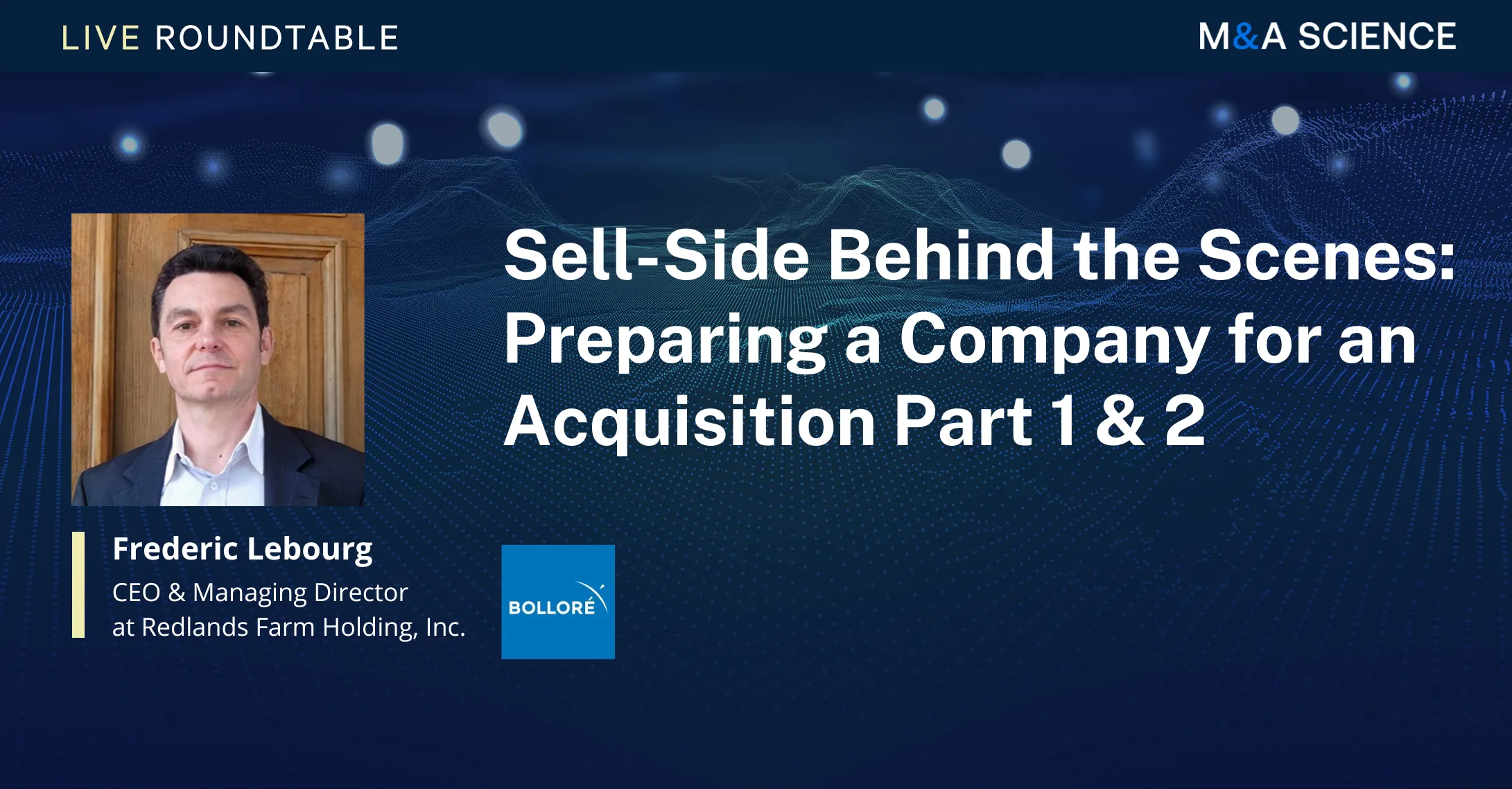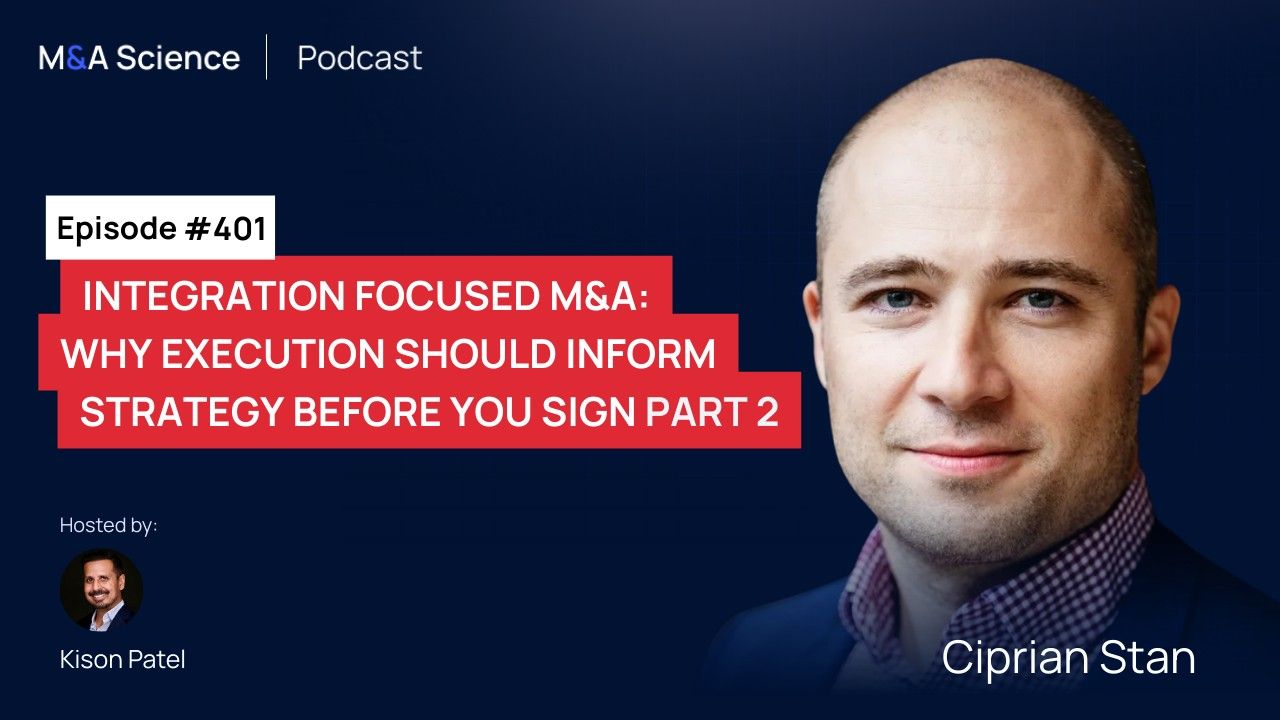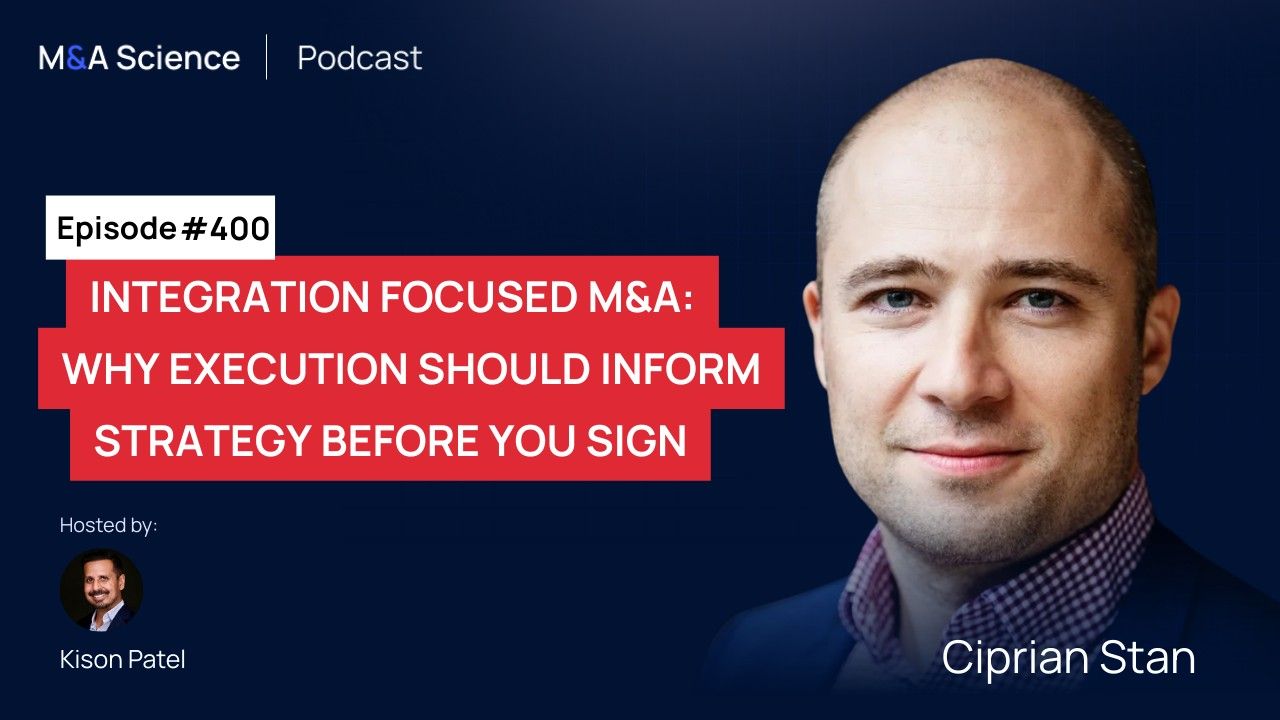
Frederic Lebourg
Episode Transcript
Avoid Disrupting the Business
It's complicated, and no matter how well you prepare in advance, you cannot possibly think of every piece of diligence that the buyer will want to see. There may be some unexpected terms, and you may end up in a situation where the buyer tells you they want to talk to key suppliers or customers.
That will be difficult because immediately, you will create massive angst on your supplier side. They might expect to be replaced because a bigger company always has its own suppliers. Conversely, that will leave scars if the deal doesn't happen.
It's worse on the customer side because you have developed a relationship with the customers, and suddenly, you're leaving them for cash. Talking to them is one of the most complicated part of selling a business because they know that things will change - your promotion, offers, and marketing support.
If you are in this situation, it will disrupt your business. And all of this can happen pre-LOI.
Another thing is that they may decide they don't like your head of sales, and that person will be gone in 2 months. So some people will definitely lose their jobs because they already have those positions in their company and they don't want to pay twice.
Backdoor-Buyer Due Diligence
The best thing sellers can do is to fully understand the company's buyer. What is their corporate culture? But of course, it's hard to ask incisive questions to someone considering giving you a lot of money. So you have to do backdoor due diligence with people who know people who are working for the buyer.
With much preparation, you can mentally prepare yourself and your people for what's going to happen when the deal goes down. Of course, buyers will always look to be friendly to extract information from you but that's not always the case.
You can start by asking to investigate their previous acquisitions. Nowadays you can just look at Linkedin and figure out who their previous acquisitions were. You can just count the number of people in. If you see 9 or 10 people are gone during the acquisition, you can pretty much have a clear vision of the future regardless of what everyone's been telling you.
Just reach out to them and ask for a phone exchange so you can discuss personal experiences during the acquisition. It's a genuine question, and you can just be direct.
When to involve Team
During the initial contact I would strongly advise that you keep it to yourself. It's just the first appointment and screening and there's not much certainty if the deal will go through. So do not introduce a whole lot of people in the discussion because you are going to create unnecessary anxieties. There's no point creating anxieties if you yourself don't know if the deal is going anywhere.
But as you start the financial disclosure process, you have no choice. You have to get your accountant or your CFO in the loop. And once you start talking to one person, you best believe that people will know about it everywhere. And at that point, people are going to feel betrayed.
The only thing that can make them feel better is some form of financial benefit. If you can convey the message that they are still going to get a year's worth of salary and they can still choose whether or not to stay in the company, then all of a sudden you're creating a situation that is more acceptable to them.
If the buyer refuses to take care of the compensation then as an owner you can decide on your own and give the people 10% of the proceeds. That's an excellent way to go about it.
Post-Close Success
You should care about post-close success because you have invested much in the business. You don't want to see your own brand go down. You should also care about the success of the people in general because it's a small world. You will bump into people 9:45 years from now and you will need their help at some point.
Especially if you are an industry specialist, always be careful and manage your long-term relationship. Don't treat people badly or it will come back to you. If you don't do it for the moral side of it then do it for your own self-preservation.
Leadership Alignment
As I said, it all starts with doing your own diligence on the buyer. If they are a good acquirer, you can establish that with your people and show them what the buyer has done to their other acquisitions, such as better benefits and programs.
If they are a bad acquirer, then you can plan for monetary incentives so people with operate with the transaction. Remember no matter how strongly you want it, people can internally sabotage the deal. You don't want that to happen. So always be transparent as much as possible.
Also, remember that the transaction may fail, and there is a morning after that. You will have to face the people you mistreated and prioritized money over. So prioritize people's happiness to avoid problems.
Talk to the people who will ultimately decide the future of the transaction at a high level. If you cannot talk to them, you're better off passing on the deal because if you have no idea about the mindset of the people, you could be in trouble.
How to execute buyer's diligence
Just be blunt and direct and ask about their plan.
- What is your plan?
- Are you going to keep that unit operating independently?
- Are you going to integrate that unit into your larger corporation?
- If you do that, how quickly?
We should also consider how much value the buyer can create from the transaction. This is why I'm a big believer that you should run differently use at the same time. Even if it's more exhausting and demanding, having one potential acquirer will never work in your favor.
And if you find yourself in that position, always have a breakup fee. So if that company costs you potential deals, you walk away with something for your company. So set the breakup fee as high as possible and you need good counsel for that.
The moment you put recovery on the LOI, it will get a lot longer because you're trying to define what circumstance the breakup fee is applicable.
Cultural Fit
If you ask the CEO of a Fortune 500 company about the teacher, you will get a cookie-cutter answer. Something that has been worked through the level of corporate and vetted by the legal department.
You can talk to the people who used to work for that company or someone who has a connection with someone who worked there. They can help help you future out what is the real culture of the company.
Deal Fever
When the deal is closed in the morning in the bank, people often think they can do it again. But that rarely happens in reality. For a new business to be successful, it's about skills, but it's also about luck. Whoever tells you that it was carefully mapped out is delusional in my opinion.
There are many things we don't control, particularly what your competitor may or may not do, and that will help you or stop you. If you were lucky enough to create something from nothing and grow it to a $50 million company in a few years, many things had to fall into place.
Again I'm talking from my experience, which is the food industry. If you are in the pharmaceutical industry and find something unique, that's a different story. But usually, it's a combination of work and luck.
Regret about Selling the Business
It's a combination of factors in your personal life, depending on what stage you are in. Since I've done it a lot of times, when you see the money, you got everything. You have no confidence in yourself that you can do it all over again.
The second part is your confidence that you can keep growing at the same rate if you did not sell the company. You can eventually lose control of your company and lose all your money and everything you work for.
This is why you need to have a good group of people you trust who have no vested interest in their answers so they can give them to you straight. But certainly, it's better to sell than try to continue growing the business and risk everything due to many things you cannot control.
Reasons to Walk Away from A Deal
Price reduction. After the diligence, if they come back with a very low valuation, either you walk away or accept a complete revision of the deal structure. Remember that the people you are dealing with are not there to help you but to make the best deal for their company.
If they find out that your product is something easily duplicable, they can walk away and do it themselves and squash you like a bug. It is why you need to research and find out what kind of people you are dealing with.
Choosing the Best Buyer
Do not go necessary for the best known or the bigger name company. Just because they are more famous doesn't mean they are good acquirers. This is why it's so important to do backdoor buyers due diligence.
M&A Software for optimizing the M&A lifecycle- pipeline to diligence to integration
Explore dealroom

Want to wear your M&A expertise?
Check out the M&A Science store.




.jpeg)
